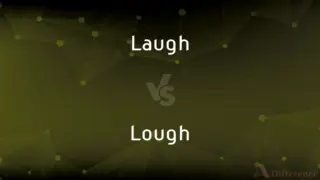Wit vs. Humor — What's the Difference?
Edited by Tayyaba Rehman — By Fiza Rafique — Updated on September 22, 2023
Wit is a form of intellectual humor that involves quick thinking and clever expression, while Humor is a broader term that encompasses all things funny, including wit. Wit is sharp; humor can be gentle or broad.

Difference Between Wit and Humor
Table of Contents
ADVERTISEMENT
Key Differences
Wit and Humor are both elements that bring laughter and enjoyment, but they serve different functions. Wit involves cleverness, rapid mental agility, and often sarcasm, used for a quick laugh or to make a poignant observation. Humor, on the other hand, is a broader term that can include slapstick, irony, satire, and indeed, wit itself.
Wit often requires a certain level of intelligence from the audience to be fully appreciated. Understanding the subtlety and nuances in the language is key. Humor can be more accessible and can appeal to a wider range of audiences, not always requiring intellectual engagement to the same extent.
Wit is more targeted in its approach, aiming for a quick and insightful hit of laughter or recognition. Humor can be more general, with the objective of entertaining or amusing, without necessarily having a deeper point. In this way, wit is often more cutting or incisive, while humor can be more forgiving and inclusive.
Wit tends to be more verbal and is often situational, relying on the right moment, the right audience, and the right context. Humor can be situational but can also be physical, as seen in slapstick, or visual, as seen in cartoons. Therefore, wit is more specific in its form, while humor can come in a variety of formats.
Comparison Chart
Nature
Intellectual
Broad
ADVERTISEMENT
Accessibility
Requires a certain intellect
Generally more accessible
Intent
Quick, insightful laughter
General entertainment
Forms
Mostly verbal
Verbal, physical, visual
Audience
Specific
Wide-ranging
Compare with Definitions
Wit
Often employs sarcasm or irony.
With a stroke of wit, he exposed the irony of the situation.
Humor
Something that is funny.
That joke was pure humor.
Wit
Intellectual humor involving quick thinking.
Her wit was the highlight of the evening.
Humor
The quality of being amusing.
His humor brightened the room.
Wit
Quickness of perception or discernment.
His wit allowed him to respond instantly to the question.
Humor
Tendency to find or create amusement.
She had a great sense of humor.
Wit
A mental sharpness and inventiveness.
Her wit was as sharp as a tack, never missing a beat.
Humor
Disposition or temperament.
His good humor made him pleasant to be around.
Wit
Wit is a form of intelligent humour, the ability to say or write things that are clever and usually funny. Someone witty is a person who is skilled at making clever and funny remarks.
Humor
The quality that makes something laughable or amusing; funniness
Could not see the humor of the situation.
Wit
The capacity for inventive thought and quick understanding; keen intelligence
She does not lack perception or native wit
He needed all his wits to figure out the way back
Humor
That which is intended to induce laughter or amusement
A writer skilled at crafting humor.
Wit
A natural aptitude for using words and ideas in a quick and inventive way to create humour
His caustic wit cuts through the humbug
Humor
The ability to perceive, enjoy, or express what is amusing, comical, incongruous, or absurd
"Man's sense of humor seems to be in inverse proportion to the gravity of his profession" (Mary Roberts Rinehart).
Wit
Have knowledge
I addressed a few words to the lady you wot of
Humor
One of the four fluids of the body, blood, phlegm, choler, and black bile, whose relative proportions were thought in ancient and medieval physiology to determine a person's disposition and general health.
Wit
That is to say (used to be more specific about something already referred to)
The textbooks show an irritating parochialism, to wit an almost total exclusion of papers not in English
Humor
A body fluid, such as blood, lymph, or bile.
Wit
The natural ability to perceive and understand; intelligence.
Humor
Aqueous humor.
Wit
Often wits Practical intelligence; shrewdness or resourcefulness
Living by one's wits.
Humor
Vitreous humor.
Wit
Wits Sound mental faculties; sanity
Scared out of my wits.
Humor
A person's characteristic disposition or temperament
A boy of sullen humor.
Wit
(Archaic) A person of exceptional intelligence.
Humor
An often temporary state of mind; a mood
I'm in no humor to argue.
Wit
The ability to express oneself intelligently in a playful or humorous manner, often in overturning audience expectations
A writer with a scintillating wit.
Humor
A sudden, unanticipated inclination; a whim.
Wit
A person noted for this ability, especially in conversation
“My mother, the family wit and teaser, knew better than to joke about the disaster” (Donald Hall).
Humor
Capricious or peculiar behavior.
Wit
Intelligent playfulness or humor in expression, as in speech, writing, or art
Novels known for their wit and inventiveness.
Humor
To comply with the wishes or ideas of (another) in order to keep that person satisfied or unaware of criticism; indulge
"When she was convinced a man was giving her the eye, we humored her and agreed" (Jhumpa Lahiri).
Wit
To be or become aware of; learn.
Humor
To adapt or accommodate oneself to
Humored his uncle's peculiarities.
Wit
To know.
Humor
Alternative spelling of humour
He was in a particularly vile humor that afternoon.
Wit
Sanity.
He's gone completely out of his wits.
Humor
Alternative spelling of humour
I know you don't believe my story, but humor me for a minute and imagine it to be true.
Wit
The senses.
Humor
Moisture, especially, the moisture or fluid of animal bodies, as the chyle, lymph, etc.; as, the humors of the eye, etc.
Wit
Intellectual ability; faculty of thinking, reasoning.
Where she has gone to is beyond the wit of man to say.
Humor
A vitiated or morbid animal fluid, such as often causes an eruption on the skin.
Wit
The ability to think quickly; mental cleverness, especially under short time constraints.
My father had a quick wit and a steady hand.
Humor
State of mind, whether habitual or temporary (as formerly supposed to depend on the character or combination of the fluids of the body); disposition; temper; mood; as, good humor; ill humor.
Examine how your humor is inclined,And which the ruling passion of your mind.
A prince of a pleasant humor.
I like not the humor of lying.
Wit
Intelligence; common sense.
The opportunity was right in front of you, and you didn't even have the wit to take it!
Humor
Changing and uncertain states of mind; caprices; freaks; vagaries; whims.
Is my friend all perfection, all virtue and discretion? Has he not humors to be endured?
Wit
Humour, especially when clever or quick.
The best man's speech was hilarious, full of wit and charm.
Humor
That quality of the imagination which gives to ideas an incongruous or fantastic turn, and tends to excite laughter or mirth by ludicrous images or representations; a playful fancy; facetiousness.
For thy sake I admitThat a Scot may have humor, I'd almost said wit.
A great deal of excellent humor was expended on the perplexities of mine host.
Wit
A person who tells funny anecdotes or jokes; someone witty.
Your friend is quite a wit, isn't he?
Humor
To comply with the humor of; to adjust matters so as suit the peculiarities, caprices, or exigencies of; to adapt one's self to; to indulge by skillful adaptation; as, to humor the mind.
It is my part to invent, and the musician's to humor that invention.
Wit
Know, be aware of constructed with of when used intransitively.
You committed terrible actions — to wit, murder and theft — and should be punished accordingly.
They are meddling in matters that men should not wit of.
Humor
To help on by indulgence or compliant treatment; to soothe; to gratify; to please.
You humor me when I am sick.
Wit
(Southern American English) with
Humor
A message whose ingenuity or verbal skill or incongruity has the power to evoke laughter
Wit
To know; to learn.
Brethren, we do you to wit [make you to know] of the grace of God bestowed on the churches of Macedonia.
Thou wost full little what thou meanest.
We witen not what thing we prayen here.
When that the sooth in wist.
Humor
The trait of appreciating (and being able to express) the humorous;
She didn't appreciate my humor
You can't survive in the army without a sense of humor
Wit
Mind; intellect; understanding; sense.
Who knew the wit of the Lord? or who was his counselor?
A prince most prudent, of an excellentAnd unmatched wit and judgment.
Will puts in practice what wit deviseth.
He wants not wit the dander to decline.
Humor
A characteristic (habitual or relatively temporary) state of feeling;
Whether he praised or cursed me depended on his temper at the time
He was in a bad humor
Wit
A mental faculty, or power of the mind; - used in this sense chiefly in the plural, and in certain phrases; as, to lose one's wits; at one's wits' end, and the like.
I will stare him out of his wits.
Humor
The quality of being funny;
I fail to see the humor in it
Wit
Felicitous association of objects not usually connected, so as to produce a pleasant surprise; also. the power of readily combining objects in such a manner.
The definition of wit is only this, that it is a propriety of thoughts and words; or, in other terms, thoughts and words elegantly adapted to the subject.
Wit which discovers partial likeness hidden in general diversity.
Wit lying most in the assemblage of ideas, and putting those together with quickness and variety wherein can be found any resemblance or congruity, thereby to make up pleasant pictures in the fancy.
Humor
(Middle Ages) one of the four fluids in the body whose balance was believed to determine your emotional and physical state;
The humors are blood and phlegm and yellow and black bile
Wit
A person of eminent sense or knowledge; a man of genius, fancy, or humor; one distinguished for bright or amusing sayings, for repartee, and the like.
In Athens, where books and wits were ever busier than in any other part of Greece, I find but only two sorts of writings which the magistrate cared to take notice of; those either blasphemous and atheistical, or libelous.
Intemperate wits will spare neither friend nor foe.
A wit herself, Amelia weds a wit.
But my five wits nor my five senses canDissuade one foolish heart from serving thee.
Humor
The liquid parts of the body
Wit
A message whose ingenuity or verbal skill or incongruity has the power to evoke laughter
Humor
Put into a good mood
Wit
Mental ability;
He's got plenty of brains but no common sense
Humor
A form of entertainment.
The humor in the film appealed to both kids and adults.
Wit
A witty amusing person who makes jokes
Wit
Skill in using words cleverly.
His wit made even the mundane interesting.
Common Curiosities
What is Wit?
Wit is intellectual humor that involves quick thinking and clever expression.
Is Humor always intellectual?
No, humor can be intellectual but can also be slapstick, physical, or visual.
What forms can Humor take?
Humor can be verbal, physical, or visual, among other forms.
Is Wit inclusive?
Wit can be exclusive, often requiring a certain level of intellect to be fully appreciated.
Is Wit a form of Humor?
Yes, wit is a subset of humor, focused on intellectual and quick-witted comedy.
Is Wit verbal?
Wit is usually verbal and often relies on the clever use of language.
What is Humor?
Humor is the quality of being amusing or entertaining.
Can you have Humor without Wit?
Yes, humor encompasses a wide range of amusing qualities, not limited to wit.
Is Wit always sarcastic?
No, but wit often employs elements like sarcasm or irony for effect.
Who appreciates Wit?
Wit is often best appreciated by those who enjoy intellectual and clever comedy.
How broad is Humor?
Humor is a broad term that includes many forms of amusement and entertainment.
Is Humor situational?
Humor can be situational but is not limited to any particular setting or context.
Is Wit situational?
Wit is often situational, requiring the right moment and context for maximum effect.
Can Wit be visual?
Wit is primarily verbal, but visual elements can occasionally be used to enhance it.
Is Humor inclusive?
Humor is generally more inclusive and can appeal to a wide range of audiences.
Share Your Discovery

Previous Comparison
Laugh vs. Lough
Next Comparison
Fast vs. FirstAuthor Spotlight
Written by
Fiza RafiqueFiza Rafique is a skilled content writer at AskDifference.com, where she meticulously refines and enhances written pieces. Drawing from her vast editorial expertise, Fiza ensures clarity, accuracy, and precision in every article. Passionate about language, she continually seeks to elevate the quality of content for readers worldwide.
Edited by
Tayyaba RehmanTayyaba Rehman is a distinguished writer, currently serving as a primary contributor to askdifference.com. As a researcher in semantics and etymology, Tayyaba's passion for the complexity of languages and their distinctions has found a perfect home on the platform. Tayyaba delves into the intricacies of language, distinguishing between commonly confused words and phrases, thereby providing clarity for readers worldwide.
















































